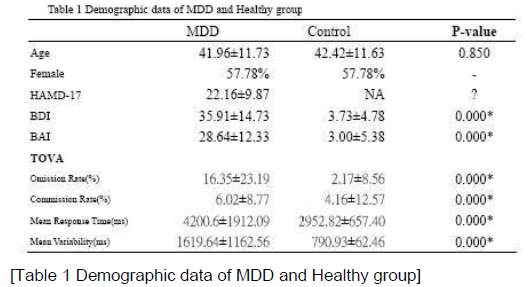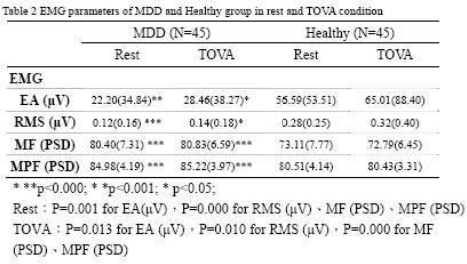No CrossRef data available.
Article contents
Electromyography change during the test of variables of attention tova in patients with major depressive disorder
Published online by Cambridge University Press: 16 April 2020
Abstract
It has been well studied that depression is associated with muscle rigidity and chronic pain. However, few studies have examined the differences of electromyography (EMG) response to cognitive stressor between patients with major depressive disorder (MDD) and the healthy control. We conducted a cross-sectional and case-control (sex and age) study to observe the EMG change under the test of variables of attention (TOVA) which is a computerized test of attention. Forty-five patients with MDD and the same number of matched subjects participated. Screening of mental illness was carried out through the Mini-International Neuropsychiatric Interview. The EMG of neck muscle was recorded before (2 minutes, rest condition) and during the subject performed TOVA (about 22 minutes, TOVA condition). Raw data were processed to calculate the typical time and frequency domain EMG parameters. MDD patients had lower electromyographic activity (EA) and root mean square (RMS) than control group in both the rest and TOVA condition. MDD patients had higher EA and root RMS than control group in both the rest and TOVA condition. MDD group had higher median frequency (MF) and mean power frequency (MPF) than controls in both the rest and TOVA condition. MDD group had significant change between rest and TOVA in the above four parameters. However, health control group did not have this difference between two conditions. The result showed significant muscle rigidity change in MDD patient when their condition shifted form relaxation to stress. This might be the reason why MDD patients suffer from severe chronic pain.


- Type
- P02-23
- Information
- European Psychiatry , Volume 26 , Issue S2: Abstracts of the 19th European Congress of Psychiatry , March 2011 , pp. 617 - 618
- Copyright
- Copyright © European Psychiatric Association 2011



Comments
No Comments have been published for this article.